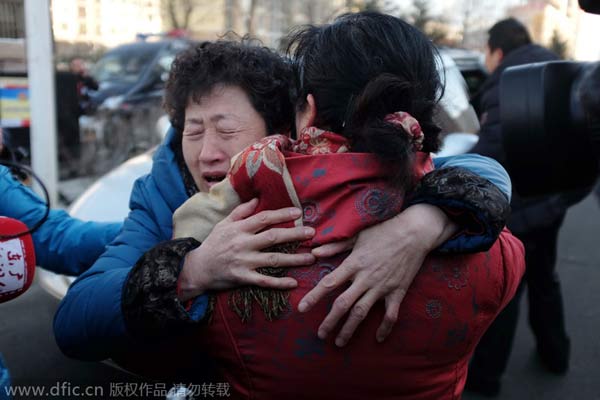Accused who caused innocent man's execution sentenced to death
By Ma Danning (chinadaily.com.cn) Updated: 2015-02-09 11:15
Review of Huugjilt's case
Yan Feng, a friend and colleague of Huugjilt, tells how they heard someone cry out in a women's toilet as they passed by. Huugjilt asked Yan to go with him into the toilet to see what had happened. There they saw a woman's body and immediately ran out. Huugjilt then reported it to police despite Yan's attempts to persuade him to keep quiet.
A month later, Huugjilt was sentenced to death by the Hohhot Intermediate People's Court. His appeal was rejected, the death penalty was approved by the region's higher court and Huugjilt was executed on June 10, 1996.
It only took 61 days from the case to be reported to the man's execution. This happened amid China's sweeping national campaign to strike hard against criminal activities, when public security, procuratorial organs and courts were encouraged to take swift and severe measures in dealing with criminal cases.
Official figures suggested in the year 1995 alone, public security departments nationwide handled 1.5 million criminal cases, many involving illegal use of guns, drug and organized crime.
"The crackdown played a big role in maintaining social stability in the time of economic and social transformation from a planned economy to a market-oriented economy, but the legal departments' work had serious flaws," said Ai Guoping, a lawyer from Hohhot.
Detectives working in the Hohhot public security bureau at the time admitted that during the campaign their work performance was rated by an annual quota on how many criminal cases they uncovered. They were "eager to wind up a case, and the use of illegal punishment and inducement on suspects existed in case investigations."
Under the circumstances, the swift settlement on Huugjilt's case was approved by the higher court despite the fact evidence was "questionable or inadequate," according to the retrial.
Doubts on the case emerged in 2005 when another alleged serial rapist and killer, Zhao Zhihong, confessed to the murder of the woman. Zhao allegedly raped and killed 10 women and girls between 1996 and 2005. He stood trial in late 2006 and no verdict has yet been issued.
Deputy chief judge Zhao said the legal department had learned a "grieved and profound lesson from the erroneous judgement of Huugjilt's case."
"The court is applying for national compensation for Huugjilt's wrongful sentence," he said.
Through the years, the Inner Mongolia autonomous regional political and legal departments have organized several reviews of the case. In 2011, the regional higher court assigned five judges to form a review penal to prepare for the retrial.
Public consensus was also an important driving force for the court to conduct the retrial and self-inspection.
On Monday, spokesman of the Inner Mongolia higher court Li Shengchen said a group has been set up to seek those responsible for the initial verdict.
- Govt encourages people to work 4.5 days a week
- Action to be taken as HIV cases among students rise
- Debate grows over reproductive rights
- Country's first bishop ordained in 3 years
- China builds Tibetan Buddhism academy in Chengdu
- Authorities require reporting of HIV infections at schools
- Typhoon Soudelor kills 14 in East China
- Police crack down on overseas gambling site
- Debate over death penalty for child traffickers goes on
- Beijing to tighten mail security for war anniversary








